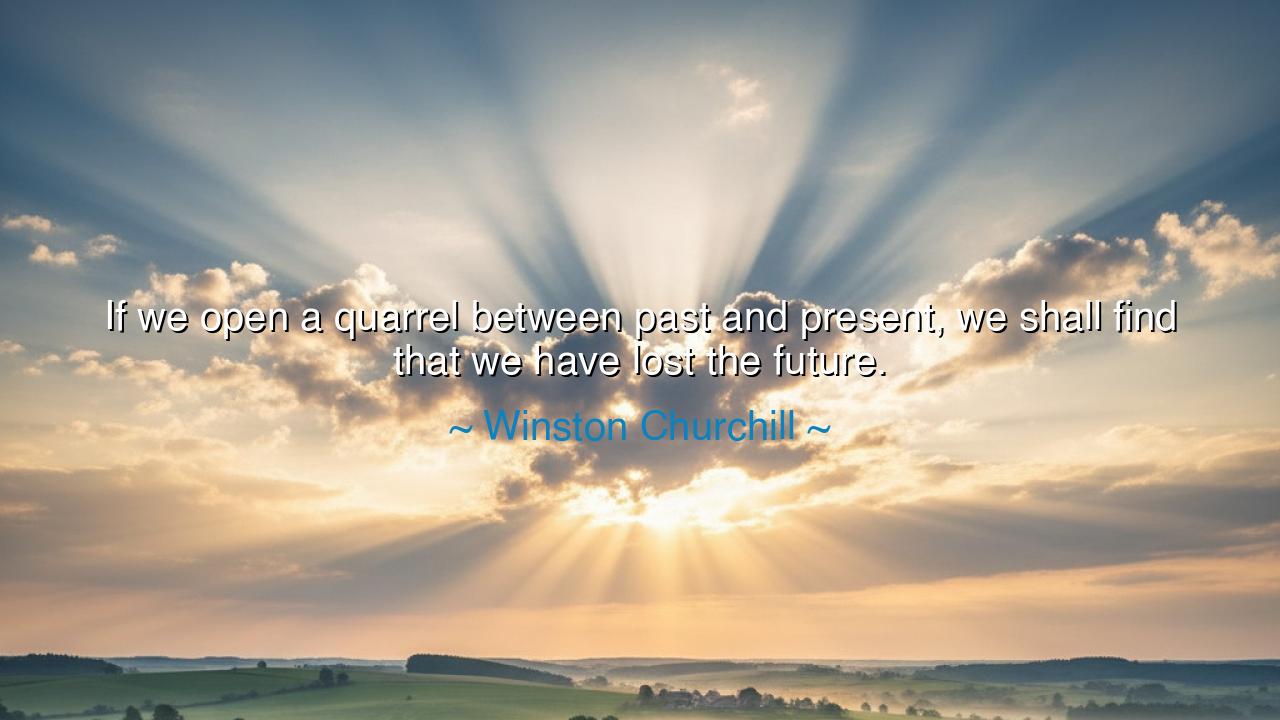
If we open a quarrel between past and present, we shall find that
If we open a quarrel between past and present, we shall find that we have lost the future.






In the vast tapestry of history, one thread often stands out—the tension between the past and the present. Winston Churchill, with the wisdom borne of his tumultuous era, warns us: "If we open a quarrel between past and present, we shall find that we have lost the future." These words resonate with a truth that transcends time and place. They speak to the dangers of becoming so fixated on past grievances or nostalgia that we lose sight of the potential that lies ahead. The present is a fleeting moment, and if we waste it in endless battles with the past, we risk losing the future that is unfolding before us.
The ancients understood this delicate balance between honoring the past and embracing the future. The Greeks, in their pursuit of wisdom, constantly reflected on their history, seeking to learn from it, but never allowing it to chain them to a static existence. Heraclitus, the great philosopher, spoke of the constant flow of life, famously stating, "You cannot step into the same river twice." Time moves forward, and while the lessons of the past may inform our actions, they must not hinder our ability to adapt and grow in the face of the ever-changing present.
In Rome, the great empire rose not just because it honored its past, but because it knew how to innovate and evolve. Julius Caesar, in his conquest of Gaul, faced the challenge of uniting diverse cultures and peoples. While he respected Roman tradition, he did not hesitate to adapt new tactics and embrace innovation in warfare. Had he been consumed by the weight of past glories or the demands of tradition, he would not have been able to navigate the challenges of his time. Caesar’s ability to respect the past while forging ahead with a vision for the future is a testament to the idea that the present is a battleground where we must fight for the future, not linger in the past.
Churchill’s wisdom is particularly poignant when we reflect on World War II, a time when the future of civilization itself was at stake. Europe, having been scarred by the Great War, was once again drawn into conflict. But Churchill, as a leader, understood that focusing on past mistakes and grudges would not win the war. He knew that to face the Nazi threat, Britain had to focus on the present and future, rallying its people with hope, courage, and resolve. Had Britain been consumed by the wounds of the past, it might have failed to act decisively. Instead, Churchill's ability to lead with an eye toward the future, even in the darkest hours, was a defining strength that shaped history.
The lesson Churchill imparts is clear: while it is crucial to understand and learn from the past, we must not let it dominate us. The present is a time for action, for forging new paths, for facing the challenges that lie ahead. To dwell too deeply on past failures, resentments, or glories is to risk losing sight of the future. We must ask ourselves: what is the cost of constantly looking back? If we are not careful, we will find ourselves stuck in a cycle of regret, anger, or nostalgia, unable to move forward.
In our own lives, this wisdom is essential. We cannot live in perpetual conflict with the past, whether it be personal regrets or national history. The future requires that we embrace change, that we recognize the opportunities that lie ahead, even if they challenge our beliefs or traditions. Just as the Renaissance emerged not from a society that clung to medieval ideals, but from one that was willing to embrace the new age of discovery and learning, so too must we seek to balance respect for the past with a vision for the future. Only by doing so can we create a better world for those who come after us.
Thus, the lesson of Churchill’s words is not to forget the past, but to integrate it wisely. We must acknowledge our history, learn from it, and honor it, but we must not be bound by it. The future beckons, and it is in the present that we shape it. Let us not lose ourselves in the quarrels of what has been, but instead, focus our energy on what is yet to come. By doing so, we ensure that the future will be ours to create, not lost to the shadows of the past.






AAdministratorAdministrator
Welcome, honored guests. Please leave a comment, we will respond soon